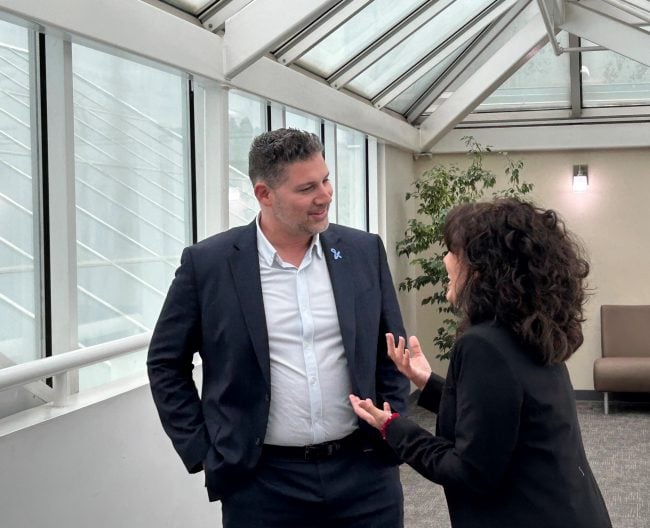DAYTON, Ohio – The one thing that both sides of the strike atthe $91 million Day-Met Credit Union appear to agree upon is thatthe fight is essentially about salary and not health benefits, ashas been the trend in other places, although the strikers chargedthe credit union is “stingy” about those as well. “The credit unionis doing very well, everybody is making money, our CEO has a salaryof $106,000 per year and we just think we should be included inthat,” said Beverly Hafer, a bookkeeper and 18-year veteran of thecredit union who says she began as a telephone teller for thecredit union. Hafer and other strikers from the Office andProfessional Employees International Union Local 98 say that salaryis the issue. Most do not receive health insurance, nor do they getdental insurance, they say. They also maintain that the creditunion has refused to negotiate on salary issues and charge that thecredit union has hired a union busting lawyer. “He has a reputationall around the state,” Hafer almost growled when talking aboutRobert Dunlevey, the lawyer the credit union hired when the strikebegan. “We know he is looking to break this union.” Faced with allthis, Hafer and the other employees, many of whom have worked forthe credit union for years, walked out February 1. Ironically, thiscredit union was founded in 1957 to serve the members of UnitedAuto Workers Local 696 which organized the local Delphi auto partsplant. That union has begun acting to support the 30 strikers andthe AFL-CIO has also begun to get involved. “Well, they seem to besharing my salary with the public, that's always nice,” noted MikeRiesterer, CEO of the credit union. “We haven't been sharinganyone's actual salaries with the public because we believe that isbetween the organization and the employee.” Contrary to thestrikers' claims, Riesterer says the credit union has asked theunion to negotiate from the beginning and can produce letters tothat effect from the credit union to the president of the local.“We have always wanted to talk and have been very clear aboutthat,” Riesterer said, “but I guess in the middle of a strike thetruth is the first casualty.” Riesterer said that, contrary to thestrikers' claims, the credit union provided generous healthcoverage, which included dental coverage, for $10 per month to anyemployee who was not covered by a spouse's coverage. Employeeswhose families were charged more money for their coverage onaccount of a credit union employed spouse received compensationfrom the credit union to cover that additional cost. “It's simplyinaccurate for them to say that we don't offer health or dental,”Riesterer said. Riesterer agreed with the strikers that this was afight about money, but disagreed sharply with the strikers'contention that they were underpaid and had not received a raise ineight years. “The only way they get to the eight year figure is toinclude the current period under negotiation,” Riesterer said. “Thefact is the current contract is two and a half years old and theprevious contract contained wage increases.” He contended that thereal salary fight came about after the credit union board, all ofwhom are union members, had decided to hold firm on the salaryquestion after seeing CUNA's Salary Survey which found the creditunion's salaries to be above the 90th percentile for credit unionsof its size nationwide. “My board believes that its firstresponsibility must be to our 16,482 members, not 30 employees,” hesaid. “One reason we have very low turnover at this credit union isthat they know that there really isn't any other place in Daytonwhere they can do quite as well.” In place of a salary increase,Riesterer said the credit union had offered employees a series ofbonuses they could earn in lump sum payments for attainingperformance goals, a proposal that Hafer and the other strikersappeared to reject out of hand. Riesterer explained that the creditunion board, despite their union background and pro-unionsentiments, felt that it had to take a firm hand with the salariesbecause of a previous situation with another nearby union creditunion that had been forced to merge with Day-Met about three yearsago. The same union had been organized in that credit union,Riesterer explained, and that credit union had not compromised itsdemands even when it became clear doing so would have helped savethat credit union, he said. That history helped motivate the boardto act, he explained, not any anti-unionism. “It's reallyridiculous to say that we are trying to bust the union,” Riesterersaid. “Far from it. This is a labor credit union. My whole board isunion members.” Riesterer said it was true that the credit unionhad hired Dunlevey but denied that it did so because of any “unionbusting” reputation. “We only hired him after the strike beganbecause once a strike starts the legal questions and regulationsincrease dramatically,” he said. As of press time, both sides saidthey hoped the dispute could be resolved. The credit unionforwarded its latest proposal, which included a fifty cent per paidhour increase in the amount of the lump sum bonuses available, onMarch 5. “Right now both sides have the proposal and are studyingit,” Riesterer said. “We don't have any scheduled dates forcontinuing negotiations yet, but we are hopeful.” -
|Complete your profile to continue reading and get FREE access to CUTimes.com, part of your ALM digital membership.
Your access to unlimited CUTimes.com content isn’t changing.
Once you are an ALM digital member, you’ll receive:
- Critical CUTimes.com information including comprehensive product and service provider listings via the Marketplace Directory, CU Careers, resources from industry leaders, webcasts, and breaking news, analysis and more with our informative Newsletters.
- Exclusive discounts on ALM and CU Times events.
- Access to other award-winning ALM websites including Law.com and GlobeSt.com.
Already have an account? Sign In
© 2024 ALM Global, LLC, All Rights Reserved. Request academic re-use from www.copyright.com. All other uses, submit a request to [email protected]. For more information visit Asset & Logo Licensing.









